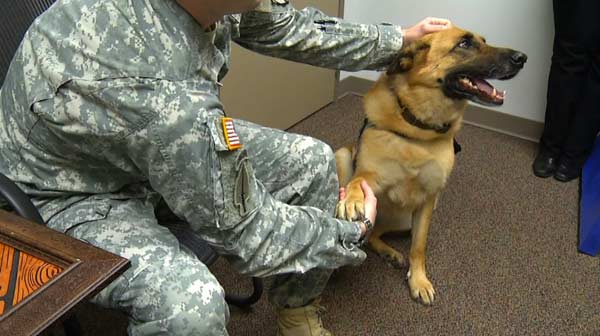Psych relief with puppies
 |
|
A German shepherd named Lexy sports on her vest an Army Ranger tab and a spray of other badges and patches she got from patients. [Photo by Lolita C.Baldor/Associated Press] |
 |
Lexy's move into therapy was unexpected. Rumayor decided to put her new puppy through the training when she realized Lexy was less of a guard dog and more of a calm cuddler.
So, Lexy went through about two and a half years of training before she was able to pin on her rank—she's a lieutenant colonel—and become certified as Fort Bragg's only therapy dog.
As the army struggles to address the broad swath of stress disorders and mental health problems brought on by more than a decade of war, one of the biggest hurdles is getting soldiers to put aside the bravado and seek treatment. Lexy, it turns out, is particularly good at that.
Van Woodruff, who was a sergeant first class, went to his scheduled appointment just a few days before he was set to get his medical retirement and move out of the army after 13 years in the service.
"It's hard for me to come to these appointments. I can't really sit in the waiting room," says Woodruff, who suffers from obsessive-compulsive disorder.
But on a sunny Wednesday morning, the Alabama native is sitting in Rumayor's office. "This is the only one I look forward to going to because of Lexy. I love dogs."
Rumayor, who wrote the Fort Bragg policy that allows her to use Lexy in her practice, says there was resistance at first.
"You don't want everybody to think they can just bring their dog to work," she says.
Rumayor also has seen what an asset the dog can be in getting soldiers to seek out therapy and consistently attend their appointments.



















